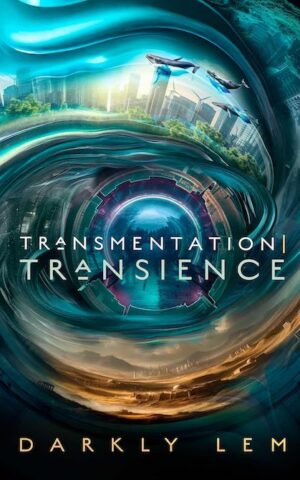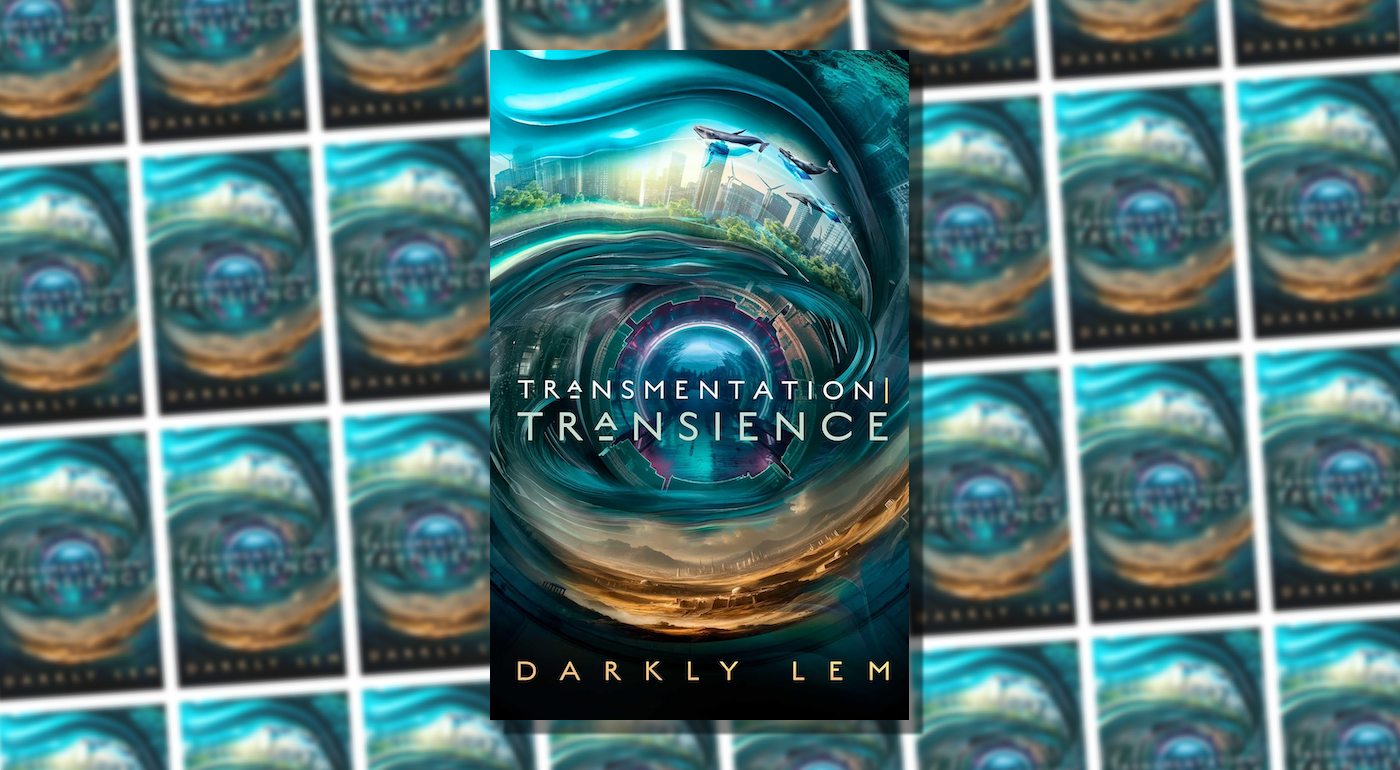We open with a spy mission among children and crabs: a training for the intelligence agencies of Burel Hird. But they stumble across more than they bargained for when they run into the scientists of Withered Stem, guarded by two Roamers Of Talas mercenary bodyguards, who are maybe all a front or a plot by the Vaish family on Firmāre. It’s messy, it’s confusing, it’s a dozen different ideologies bouncing off each other. Welcome to the many worlds of the Simulacrum.
Transmentation | Transience takes place in a sprawling multiverse, but there’s no physical travel between worlds. Instead, only your consciousness can travel between universes, jumping from host body to host body. These extra bodies—or “cloaks”, or “shells”, or “proxies”, depending on what organization you belong to—still exist when you’re not there, with spouses and families and skills and ways of speaking, but they’re just facsimiles, going about a preset routine. And if you travel to a universe you’ve never been before, a new proxy is knitted out of whole cloth, retroactively having lived out a full life for you to slip into. Reality, in every universe, bends around these travelers.
The most powerful faction of travelers is no doubt Burel Hird, a vast bureaucratic society that handles its conflicts by committee and is run by a powerful Council. The votes and policies there decide the fate of thousands of planets and trillions of citizens, and so of course it’s riddled with ruthless political feuds. Trystèsté the councilor thinks Hird is too stagnant, too willing to sit back while the universe grows dangerous. And she’s right! There are machinations in place, especially from the Vaish family, to weaken and manipulate Hird so that the Vaish’s own sphere of influence can grow. But alas, poor Trystèsté is outvoted by the old-school members of the Council like Yorek and his vice-councilor Duncan, and even her friend Priema who seems to have personal power more closely on her mind.
With Hird’s council deadlocked, it falls to the outcasts and the nomads to figure out what’s really going on. One of these is Malculm Kilkaneade, the intelligence officer whose botched mission kicks off the novel. He takes the blame and the fall, but unfortunately for Hird, he really believes all that dogma about “acting for the good of the People” and goes rogue to continue the investigation. Soon he recollides with the Of Talas bodyguards, Beinir and Shara, who suffer their own (mis)adventures in the meantime: After transferring her consciousness between universes, Shara accidentally sort-of mind-melds with a member of the Vaish family and discovers the assassination they’re plotting.
Buy the Book

Transmentation | Transience
If I had to pick one word to describe Transmentation | Transience, it would be rich. Maybe even saturated. There’s a lot to savor in the myriad characters, politicians and warriors and dutiful family men; there’s a lot to love in the plots, whether it’s intrigue, prophecy, romance, or even legal drama; and there’s a lot to ponder in the ideas it tackles. Its central premise alone—transferring consciousness between bodies—throws up a hundred questions of ethics, mind-body relations, and cosmology, and many of the characters, by nature of their existence as travelers, spend good time wrestling with what they believe.
The first of those questions is, “is all this ‘traveling’ actually real?” The book requires us to accept it, but throws in a seed of doubt by describing that Shara’s family, who can’t travel, doesn’t believe in the multiverse and thinks traveling is no more than a delusion, an episode of altered consciousness. It’s a throwaway bit of characterization, but it made me stop and think; after all, I can’t project my mind to other planets, and would probably treat anyone claiming such with a similar amount of skepticism.
The second, more vexing question is to what extent your identity is your own. When a traveler jumps to a proxy, they’re influenced by that proxy’s life; when Malculm jumps to a dreary, suburban-sprawl version of Iowa, his dialect is filled with corny euphemisms and thoughts of how he’s going to navigate traffic. He’s still himself… but he’s also a man named Milton, who’s been living here for years without Malculm in his head. Especially for travelers who might never return to their original proxy, how much of who they are is intrinsic, and how much is filtered through from their world, their relationships, their body? Beinir, one of the Roamers of Talas, has an affected, Viking-esque way of speaking that he forces himself to use no matter his body because he’s worried of who he’ll be without it.
Transmentation | Transience isn’t interested in definite answers. “Grey on grey on grey,” one character muses, and that could be the subtitle of the book were it not the already hefty Or, An Accession To The People’s Council For Nine Thousand Worlds. Burel Hird genuinely wants the best for its People and the multiverse. So does Withered Stem; so does Of Talas. As I jumped between characters, places, and motivations, I found I was rooting for them all in turn—even, and especially, when they were at odds with each other.
In some ways, the novel feels less like a unified plot and more like a cross-section of a larger universe—and that’s partly because it is. The author Darkly Lem (who is really five authors stacked in a trenchcoat) belongs to the Many Worlds Collective, a group of writers and creatives all working within this multiverse:
Many Worlds is much more than a cycle of stories. Yet stories there are. Quiet, speculative tales which also face the passing surface of others, accounts both volatile and distant and grinding out their final moments in the void. And beautiful tales, though nothing is ever certain. There is a guiding hand, to be sure—a Simulacrum. But what in the worlds can be made of that?
Belonging to a collective gives the novel almost a feel of nonfiction. In much sci-fi and fantasy, the world bends to the whims of the story, and apocalyptic stakes are common that reshape the fabric of the universe. But Darkly Lem is playing in the same sandbox as a dozen other authors, and that collaborative spirit means that stories focus on the small, human tales rather than endangering everyone’s fun. So far, a number of short stories have been published from the Many Worlds Collective, but this is the first novel.
Although overwhelming at points, I greatly enjoyed the novel. It’s unfortunate that I can’t transport my mind across the multiverse into strange and vibrant worlds, but Transmentation | Transience, like any good book, brought me briefly into its universe. That’s good enough for now.
Transmentation | Transience is available from Blackstone Publishing.
